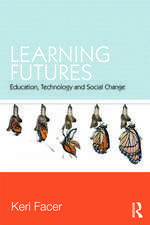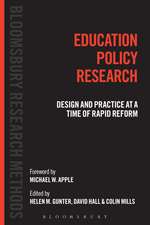Philosophy of Education in the Era of Globalization: Routledge International Studies in the Philosophy of Education
Editat de Yvonne Raley, Gerhard Preyeren Limba Engleză Paperback – 27 iul 2012
| Toate formatele și edițiile | Preț | Express |
|---|---|---|
| Paperback (1) | 477.40 lei 6-8 săpt. | |
| Taylor & Francis – 27 iul 2012 | 477.40 lei 6-8 săpt. | |
| Hardback (1) | 1114.98 lei 6-8 săpt. | |
| Taylor & Francis – 8 sep 2009 | 1114.98 lei 6-8 săpt. |
Din seria Routledge International Studies in the Philosophy of Education
-
 Preț: 302.18 lei
Preț: 302.18 lei -
 Preț: 272.12 lei
Preț: 272.12 lei - 9%
 Preț: 934.96 lei
Preț: 934.96 lei - 8%
 Preț: 382.22 lei
Preț: 382.22 lei -
 Preț: 303.94 lei
Preț: 303.94 lei -
 Preț: 478.51 lei
Preț: 478.51 lei -
 Preț: 316.65 lei
Preț: 316.65 lei - 18%
 Preț: 1218.89 lei
Preț: 1218.89 lei - 18%
 Preț: 1160.32 lei
Preț: 1160.32 lei - 13%
 Preț: 350.29 lei
Preț: 350.29 lei - 18%
 Preț: 701.69 lei
Preț: 701.69 lei - 18%
 Preț: 1000.45 lei
Preț: 1000.45 lei -
 Preț: 476.60 lei
Preț: 476.60 lei -
 Preț: 478.16 lei
Preț: 478.16 lei -
 Preț: 248.44 lei
Preț: 248.44 lei -
 Preț: 455.78 lei
Preț: 455.78 lei -
 Preț: 447.57 lei
Preț: 447.57 lei -
 Preț: 370.35 lei
Preț: 370.35 lei - 18%
 Preț: 1052.35 lei
Preț: 1052.35 lei - 26%
 Preț: 708.55 lei
Preț: 708.55 lei - 18%
 Preț: 1000.27 lei
Preț: 1000.27 lei -
 Preț: 456.77 lei
Preț: 456.77 lei - 18%
 Preț: 1228.07 lei
Preț: 1228.07 lei -
 Preț: 450.45 lei
Preț: 450.45 lei -
 Preț: 453.89 lei
Preț: 453.89 lei -
 Preț: 479.47 lei
Preț: 479.47 lei -
 Preț: 427.99 lei
Preț: 427.99 lei -
 Preț: 376.10 lei
Preț: 376.10 lei - 18%
 Preț: 1164.75 lei
Preț: 1164.75 lei - 18%
 Preț: 1163.66 lei
Preț: 1163.66 lei - 18%
 Preț: 1160.47 lei
Preț: 1160.47 lei - 18%
 Preț: 1054.75 lei
Preț: 1054.75 lei - 25%
 Preț: 938.52 lei
Preț: 938.52 lei - 18%
 Preț: 998.71 lei
Preț: 998.71 lei - 18%
 Preț: 1114.64 lei
Preț: 1114.64 lei -
 Preț: 455.78 lei
Preț: 455.78 lei - 13%
 Preț: 349.81 lei
Preț: 349.81 lei - 13%
 Preț: 349.34 lei
Preț: 349.34 lei - 18%
 Preț: 1062.98 lei
Preț: 1062.98 lei - 26%
 Preț: 764.20 lei
Preț: 764.20 lei
Preț: 477.40 lei
Nou
Puncte Express: 716
Preț estimativ în valută:
91.35€ • 97.69$ • 76.17£
91.35€ • 97.69$ • 76.17£
Carte tipărită la comandă
Livrare economică 18 aprilie-02 mai
Preluare comenzi: 021 569.72.76
Specificații
ISBN-13: 9780415653831
ISBN-10: 0415653835
Pagini: 246
Dimensiuni: 152 x 229 x 13 mm
Greutate: 0.34 kg
Ediția:1
Editura: Taylor & Francis
Colecția Routledge
Seria Routledge International Studies in the Philosophy of Education
Locul publicării:Oxford, United Kingdom
ISBN-10: 0415653835
Pagini: 246
Dimensiuni: 152 x 229 x 13 mm
Greutate: 0.34 kg
Ediția:1
Editura: Taylor & Francis
Colecția Routledge
Seria Routledge International Studies in the Philosophy of Education
Locul publicării:Oxford, United Kingdom
Cuprins
Introduction. Part I: Education in a Globalized Society 1. How Should We Educate Students Whose Cultures Frown upon Rational Disputation?: Cultural Difference and the Role of Reason in Multicultural Democratic Education Harvey Siegel 2. Can Liberals Take Their Own Side in an Argument? Robert Talisse 3. Literacy and Citizenship: Tradition, Reason, and Critique in Democratic Education Hanan Alexander 4. After All, How Small is the World: Global Citizenship as an Educational Ideal Doret de Ruyter 5. Education for Global Citizenship and Survival Randall Curren Part II: New Pedagogical Approaches 6. Why They Hate Us: A Pedagogical Proposal Irfan Khawaja 7. Global Aspirations for Gender Equality in Education: What Kind of Pedagogy? Elaine Unterhalter and Amy North 8. "Let Us Now Praise…": Rethinking Role Models and Heroes in an Egalitarian Age Meira Levinson Part III: Moral and Religious Education 9. Privilege, Wellbeing, and Participation in Higher Education Harry Brighouse and Paula McAvoy 10. In Defense of Multiculturalism Mark Halstead 11. Children’s Autonomy and Symbolic Clothing in Schools: Help or Hindrance? Dianne Gereluk 12. Global Religious Education Peter Simpson
Recenzii
"The book on the whole is to be commended for its focus on a global context, for treating the most important issues, and for showing how philosophy of education works, though it requires mature students if it is to be used effectively. Recommended for all undergraduate, graduate and research collections."--Choice, June 2010, Vol. 47 No. 10
"An entirely original collection of essays on a theme of universal importance. It merits a place on the bookshelves of anyone concerned with the education of those growing up in the twenty first century."--Roger Marples, Roehampton University
"An entirely original collection of essays on a theme of universal importance. It merits a place on the bookshelves of anyone concerned with the education of those growing up in the twenty first century."--Roger Marples, Roehampton University
Descriere
Rather than having formed a global community, today’s society is more fragmented than ever. In light of this, education faces some formidable new challenges. The authors of this collection of essays explore these challenges, and suggest some novel ways of dealing with them.






















